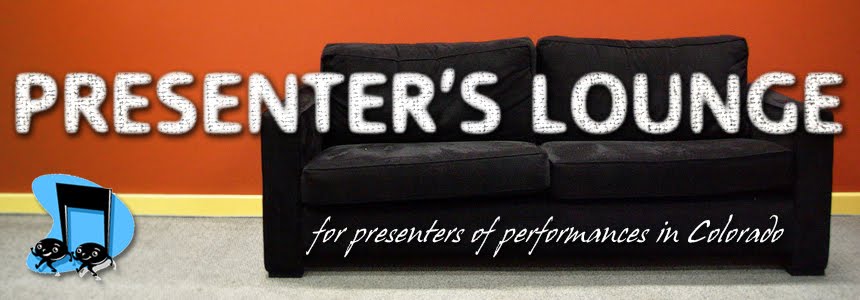Article by Chris Daniels
If you have anything more than a guitar and voice setup at your event, then you have probably experienced some of the problems of sound check, especially in multi-band shows with limited time between bands. The results can be frustrating, ear-splitting, and can really affect the show adversely ... and that is the worst side effect of all.
So here are a few tricks I've learned over the years as both a musician and as Swallow Hill’s Executive Director (a presenter) that really come in handy for making the whole process go more smoothly, with better results for everybody.
1)
Take a little time and learn about the process and equipment. There are sites like (
http://www.astralsound.com/equipment_guide.htm) that can help you. Classic mistakes that presenters make include: a) not knowing how to use a mic well and how to avoid feedback and other embarrassing mistakes when you are making announcements, b) not understanding the basic requirements of an act and the needs of your event, c) paying too much for sound and production services you don’t need. Taking the time to learn about production will help you be more professional, sound more professional, and even save you money. One of the most difficult moments for some presenters is the “thanking of the sponsors and introducing of artist or radio DJ” or any kind of talking on a mic. Most good sound people will be more than happy to take five minutes between sound check and downbeat to help you learn some good mic techniques, and they will be thrilled you asked.
2)
Get a clear stage plot WITH monitor requirements simply outlined from your acts. This is not detailed info about what everybody wants in his/ her monitor wedge, but a clear diagram of the instruments (including details like "left-handed drummer") and the number of monitor mixes that works for the band and placement of the wedges, and, if the artist uses an inner-ear system, how that will interface with the house system. If you hire young artists who do not have a stage plot, they can build one of these at a free site called
www.freestageplot.com
3)
Use a trusted sound company. They don’t have to be expensive; in fact, some of the smaller companies have better ”people skills,” the ability to adapt to your needs, and a better price range. There are any number of great companies that other presenters use. Word of mouth is the best way to get names, numbers, and info about the quality of the experience they had with the sound company. The two things to ask about are: a) Were there any problems that happened because of the PA or production company? b) Did the artists and the presenters feel good about the experience, i.e. would they hire them again?
4)
Don’t be a sound check Nazi. Artists understand that the contract says “sound check must be completed by 6:45pm, but if it takes them until 7:05 when the doors (gate) opens to complete the last few details, it is OK. Presenters get into a nervous frame of mind -- that if an artist is finishing up a check on his or her violin and some audience members are walking in, it’s a bad thing. What you may not know is that it’s kind of cool for the music lovers to see and hear. At Swallow Hill we always leaned towards making sure the sound was great even if it meant some audience members were taking their seats as a last mandolin line was checked by Sam Bush. And the audience talked about it. They sent us emails saying, “It was great, I got there early and got to see Sam playing his fiddle and even talked to him for a second before the show started.”
Now don’t get me wrong, I totally draw the line at a drummer hitting his floor-tom 500 times while he tunes the head a microtone -- that is a no go! BUT I am one of many who believe that those last few little checks of a mic or a direct line actually prove entertaining to an audience waiting for 30 minutes in their seats after doors before the show starts.
5)
Because sound and lights are obviously the essential reason for the audience to come to the show, the French call it “son et lumière,” don’t take it for granted. Learn about the equipment and the process, understand that sound check can take 35 to 40 minutes if it is a complicated setup, get amateur or young bands to contact the sound company and work with you and them to make setup and sound checks run smoothly, and then use that knowledge to hire the best sound company for your event. Once you get a good working relationship with a sound company, use that relationship to improve the shows you present.
Sound and lights are like any other aspect of an event, festival or concert series: the magic is in the details. Get comfortable with this part of your job and you will be amazed at how it lowers the stress level of putting on great shows.
Chris Daniels
Assistant Professor
University of Colorado Denver
Plus 25 years of Chris Daniels and the Kings - talk to him at exhibit space 55 at the
Jamboree
www.chrisdaniels.com
